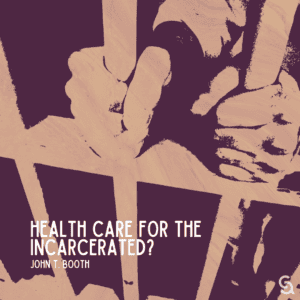For prison inmates, health care comes slowly and unpredictably
 “You will get the health care you need, but not right away. They will delay your care by downplaying your symptoms. They will not adequately respond until your symptoms get worse or critical. They do that because they look down on you.”
“You will get the health care you need, but not right away. They will delay your care by downplaying your symptoms. They will not adequately respond until your symptoms get worse or critical. They do that because they look down on you.”
These were thoughts shared by an inmate—I will call him “Frank”—who has been incarcerated for over 20 years. He was attending a spiritual retreat, held by the Thrive For Life Prison Project behind prison walls. I was there as a volunteer minister, and we talked about health care between retreat activities that included group meditation, prayer, and faith sharing. After the retreat, I kept thinking of his words: “They look down on you.”
Is it that simple?
I am mindful that the paramount concern of all prisons and jails is the safety of inmates, staff, and volunteers. Most other issues, including health care, are secondary. This is understandable, but it still seems unfair when security eclipses health and well-being.
For non-emergency care, an inmate must first submit a form requesting medical attention. Depending on the security level of the facility, the inmate might be required to have a correctional officer escort him or her to the in-house medical unit. Because of staffing and officer shortages, the wait for medical attention will be counted in days, not hours.
Many inmates complain that the medical staff does not take their concerns or symptoms seriously, or that staff members wait until their symptoms get worse before approving surgery. A study in 2017 by the Pew Charitable Trusts found that health care accounted for about one-fifth of all prison expenditures, though annual spending levels varied widely by states (from $2,173 per inmate in Louisiana to $19,796 in California). Do financial considerations impede adequate medical care?
To read the rest of this article, please visit America: The Jesuit Review of Faith and Culture. This excerpt appears here by permission.
 John T. Booth is a trial attorney with the New Jersey Office of the Public Defender, a volunteer prison minister with the Thrive for Life Prison Project in New York, and a spiritual director at St. Francis Xavier parish in Manhattan. He lives in Jersey City, N.J.
John T. Booth is a trial attorney with the New Jersey Office of the Public Defender, a volunteer prison minister with the Thrive for Life Prison Project in New York, and a spiritual director at St. Francis Xavier parish in Manhattan. He lives in Jersey City, N.J.


